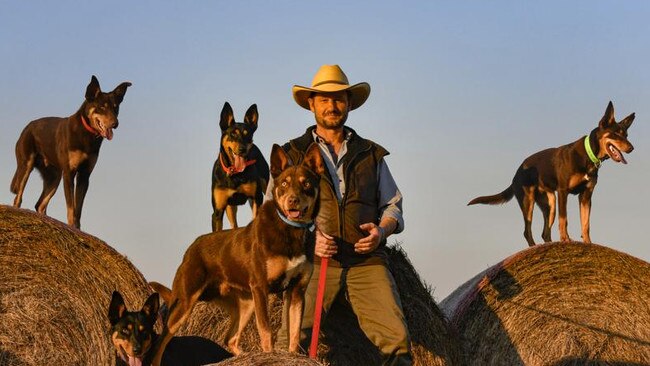Watching TV may help our four-legged friends age gracefully
Global study shows watching videos can be good for dogs, and may even help protect their vision.
Victoria
Don't miss out on the headlines from Victoria. Followed categories will be added to My News.
Make room on the couch, your pet pooch is squeezing in for some screen time.
New research shows dogs like to watch TV, especially videos starring other dogs.
Canine companions also enjoy cartoons and animal documentaries with lots of movement, but the study found dogs don’t give two woofs about watching humans on screen.
The global study of more than 1600 dogs and their owners, including those from Australia, found young dogs like bordoodle Western from Maidstone enjoy interacting with screen-based video content.
The researchers now want to understand if in older dogs this enjoyment is reduced because of failing eyesight.

The screen interaction study was led by researchers from the University of Wisconsin–Madison’s School of Veterinary Medicine in the US and recently published in the journal Applied Animal Behavior Science.
It set out to better understand what video content engaged pooches in the hope it could provide veterinarians with a “more sensitive” way of assessing dog’s vision.
Lead author Freya Mowat wrote that vision in dogs is similar to humans, but developing an eye test for canines was difficult.
“We know that poor vision negatively impacts quality of life in older people, but the effect of ageing and vision changes in dogs is largely unknown because we can’t accurately assess it,” Professor Mowat says.

“Like people, dogs are living longer, and we want to make sure we support a healthier life for them as well.”
Professor Mowat said in a statement that videos could be the key to holding a dog’s attention long enough to gather and assess critical information about visual function.
She said this study also wanted to help answer a question of interest to all dog owners: how do we help our four-legged friends age gracefully?
“As they get older, do dogs need things like brighter lighting in their environment to prevent them from tripping down the stairs in the middle of the night, or other visual cues to help them locate things? These are questions we genuinely don’t know the answers to,” Professor Mowat said.

“We do know that canine retinal function does decline with age and can decline quite significantly. So it’s more than likely that visual perception does change, but what that actually means from a lifestyle standpoint is the missing piece of the puzzle.”
She says the trick is determining the type of content that’s most engaging and appealing to dogs.

For energetic pup Western that’s a David Attenborough documentary.
He enjoys snuggling up on the couch for some TV time with owner Jade Williams when she is home from work at Urban Paws in Yarraville.
“We often watch TV together,” Jade said. “He is only eight-months-old, but he pays attention, particularly to a David Attenborough documentary.”
For some light entertainment, Weston also likes cartoons like Scooby Doo and time in front of shows like the smash ABC hit Muster Dogs.
What dogs want to watch:
• Videos featuring other animals, with dogs the most engaging
• Fewer shows starring humans: dogs ranked watching them ninth out of 17
• Documentaries, featuring animals





